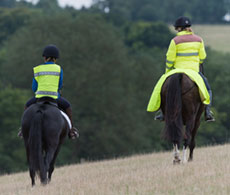
Riding horses outside: seven ways to feel more confident in open spaces
When it comes to riding out in the open, many riders can feel nervous. Trainer Mark Smith shares his tips on how to relax and make the most of riding in open spaces – whether it’s hacking, going cross-country or enjoying a sponsored ride with friends.
The psychology of open spaces
You probably feel quite safe within the confines of an arena – after all, there’s a limit to how much speed your horse can get up and, if you do take a tumble, you’re aware of what lies below and how you’re likely to fall. But when riding your horse outside, some variables are bound to be out of your control. Whether it’s unfamiliar terrain, or new objects (and creatures!) your horse might encounter, not knowing what to expect can be nerve-wracking.
Subconsciously, this is likely to affect the way you ride. You might shorten the reins or tense your upper body and, without meaning to, send a message to your horse that there’s a reason to be afraid. Your apprehension about the unknown could impact your horse’s reactions, increasing his chances of spooking and ensuring you’re less likely to enjoy the ride – no one likes having sweaty palms and a pounding heart!
Once you’re aware of what’s making you nervous, the key to gaining confidence is relatively simple: trust in your, and your horse’s, ability to deal with new situations out in the open. But how can you put that into practice? Trainer, eventer and team chaser Mark Smith shares his advice below:
1. Repetition is key
Practising riding out in the open while feeling happy and relaxed is the surest way to get both you and your horse familiar with the activity. Good experiences help to build your confidence, and the more you have, the better prepared you’ll be for any difficulties that might arise. The same is true for your horse – if you frequently ride him through water without any incident, on the rare occasion his feet do get stuck, you’ll be able to get his confidence back up quickly.
So, to build up that confidence, choose an open space you know well and walk your horse through it over and over again until you both feel completely comfortable. Once you’re feeling ready for more of a challenge, introduce short bursts of speed – increasing the duration of these bursts as you feel ready.
2. Think about your position
Be aware of how you’re riding at all times; if you’re feeling confident in the saddle and in control of your seat, you’ll automatically feel better prepared. Avoid riding with short reins and long stirrups, as this will have you sat halfway up your horse’s neck – and he may take it as a sign to hurtle his way through a hack! Instead, lengthen your reins and keep your weight in your feet. Shorter stirrups will help with this, as they’ll lower your centre of gravity and thereby improve your balance.
3. Wear safety gear
Safety should be every rider’s priority, but it should be a logical decision and not an emotional one. Train yourself to think about it rationally: you wear a back protector to help keep you safe should you happen to fall, not because you’re bound to fall.
4. Reconsider your horse’s bit
If you’ve inherited your horse, but are using the same bit as his previous owner, then keep in mind that the area of your horse’s mouth that comes into contact with the bit may have become desensitised. Add in the fact that your riding style will be slightly different, and it’s clear that feedback via this bit will be lessened – along with your control when riding in open spaces.
A different bit can help, and bitless bridles can be an especially effective solution. These bridles spread the contact area by up to 80 times, which is more than enough to gently and clearly get your message across.
5. Consider using a martingale
If your horse puts his head up and wants to go, you’ll have little chance of changing his mind mid-canter without a martingale – making this a useful bit of kit for a calm and controlled ride out in the open.
Gloves are also a must-have. It might not be raining when you head out, but if you get caught in a shower, the last thing you want is for your hands to start slipping on the reins. To avoid the panic this can cause, make sure never to set out on a ride without a pair.
6. Get coaching
A good coach can help you build confidence, but always make sure they’re aware of your aims before you have any lessons – you don’t want to win Badminton, you simply want to be content out on your horse.
An effective trainer will always try to help you communicate better with your horse, which in turn leads to a better riding experience both in the arena and out. However, don’t be afraid to question the advice you’re given. If a coach has recommended you do something in a certain way and it doesn’t seem to be working, speak up.
7. Go out in groups
If you feel you don’t yet have the confidence to lead your horse out in the open, then consider going out with horses and riders who are more experienced and are used to happily cantering around the countryside. Your horse will take his cue from them – and you’ll learn right along with him.



